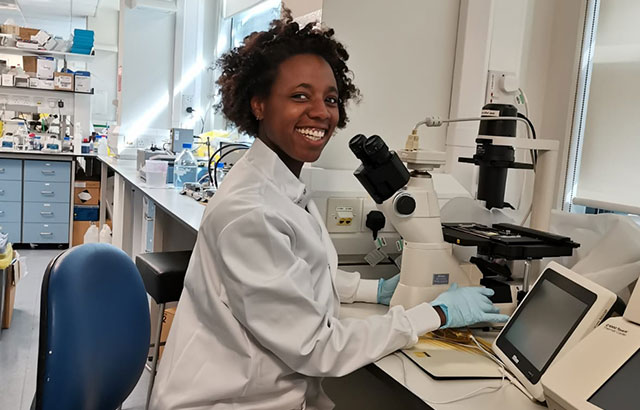WHRI COVID Diaries: Q&A with Dr Vanessa Lowe
In this Q&A WHRI researcher Vanessa Lowe shares her experience of helping with COVID-19 testing at the UK Biocentre in Milton Keynes.

Dr Vanessa Lowe
How did the opportunity to help at Milton Keynes come to your attention?
Just before the university closed due to lockdown measures, an e-mail was circulated detailing a request for volunteers at the COVID testing labs. In the week prior to this, I had mentioned to colleagues that it made sense for biologists to help with the PCR process because it's our bread and butter, then this e-mail came by. I didn't hesitate to put my name forward; I had convenient circumstances, I am not high risk, nor do I live with anyone at high risk, I can commute independently and safely by car and I have a background in molecular biology needed for qPCR and the desire to help out. I just happened to be called at random from the huge list of QMUL staff and students who put their names forward and started at the end of March within a week of lockdown.
How would you describe a typical day at the test centre?
My team leader at Milton Keynes was Dr James Whiteford, also from QMUL. He would allocate each volunteer and staff member to different sections of the process. Everyone would see this at the beginning of the shift and head to the respective section.
I was the automated PCR machine section lead. Sections leads were tasked with making sure everyone was happy in their section, troubleshoot any problems, manage stocks, send people on breaks and deliver feedback to the team leader and operations managers of any changes required. The video (below) demonstrates the individual sections and how they operate. A typical day for me mainly involved making qPCR reaction mixtures and loading the machines that distribute the mixture and sample RNA from the swabs together.
How does working at the test centre compare to your day-to-day role at the WHRI?
It's a lot more regimented in the test centre because the tests are diagnostic and there are several levels of concordance and quality control that are not routine in the work I am used to. Everything has to be done in the exact same way. My project at Queen Mary offers me a lot more freedom to design and edit parts of my experiments and troubleshoot more independently. What I do doesn't necessarily impact another member of the lab's project, whereas in the test centre, the tests are passed from one section to another and the following operator relies on the previous scientist to have done something in a precise way. Not to mention the non-stop nature of the Milton Keynes lab where thousands of samples would arrive every day to be processed. There's also the novelty of using automated machines for everything, a luxury that not all academic institutes get the chance to use, and working in what was termed a 'mega lab' with 50+ people working in at any one time. The hustle and bustle was something I've never experienced in a lab before.
What advice would you give to any researchers thinking of volunteering at a testing centre?
I would highly encourage it. During the lockdown, I found this a very enjoyable and stimulating environment. I learnt a lot, made new friends and felt a real sense of contribution by helping the country through the pandemic. Not to mention, I was lucky enough to be permitted to leave the house for the shifts and socialise with people whilst at the centre, so the isolation and restrictive movement of lockdown didn't impact me as greatly as it may have others. It was extremely hard work and at times incredibly stressful because of the pressure you feel to make sure you get through the samples safely, consistently and efficiently. The country depends on it. The shifts were long and there was an entire month where I switched my body clock to become nocturnal to do night shifts as the test centre ran samples 24/7, but I had an incredible time despite the numerous challenges.
Dr Vanessa Lowe is a Postdoctoral Researcher at the Centre for Translational Medicine and Therapeutics.